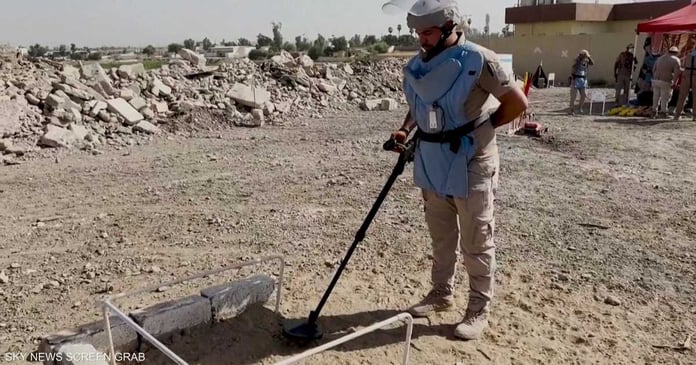And in the latest developments in terms of confronting this danger, the Iraqi Ministry of the Environment has confirmed that it is developing a plan according to which Iraq will be able, by 2028, to end to this bloody record which has cost the lives of many Iraqi lives and members.
Package details
According to the statements of the Undersecretary of the Ministry of Environment, Kamiran Ali, to the Iraqi News Agency, in which he confirmed that a meeting was held at the Department of Military Engineering Support in accordance with the Ministerial Order 223, and in coordination with relevant ministries, international organizations and oil companies from southern regions and other regions of Iraq, to develop a future demining plan.
Ali stressed that “Iraq will be mine-free by 2028”, stressing that “the Department of Mine Action is working on coordination with all parties concerned in order to achieve this goal, and that it is necessary to provide international support to Iraq, in addition to allocating sufficient funds in the 2023 budget.” to demine.”
most polluted provinces
Most of the provinces in which there are mines, according to Ali, are: Basra, Maysan and the border areas, Kut and Diyala, and there are other provinces such as Muthanna and holy Karbala, and these have also few mine areas. , and in the liberated areas there are only explosive devices, and they will be removed before military engineering.
While some commentators welcome the setting of a deadline for declaring Iraq mine-free, others believe that continuing this file without closure for several more years is enough to cost the lives of other Iraqis.
Experts stress the need to establish appropriate budgets, supplemented by the use of international expertise, to deal with this bleeding problem since the eighties of the last century.
The director of the Iraqi Center for Strategic Studies, Ghazi Faisal Hussein, said in an interview with Sky News Arabia:
Due to successive fierce wars such as the Gulf War and the American war against Iraq, over a period of more than 40 years, a large number of mines and deadly weapon remnants, including depleted uranium, have spread to various parts of Iraq, especially the borders to the south and with the borders with Iran, which are very long borders, as well About what the terrorist organization ISIS has planted in the areas that ‘it controlled the north and west of the country in provinces such as Nineveh, Anbar and Salah al-Din. This proliferation has become an existential threat to Iraqi citizens, many of whom have lost their lives or suffered serious disabilities and injuries as a result of mine explosions, and the remnants of weapons contaminated with depleted uranium, including the lethal effects slowly affect the environment, soil and agricultural crops. The United Nations and European countries, such as France, have played an important role in helping Iraq try to solve this problem that worries Iraqis, and to overcome it, there is no doubt that we must continue to coordinate with international expertise and modern technologies. It is necessary to use the maps of the spread of these mines and to process them accurately and professionally, to determine their types and to sort them clearly and in detail, since some of them may be anti-tank and armored vehicles heavy, others are anti-personnel vehicles and the like. Each type is treated with professionalism and with the utmost caution, in order to avoid losses within the teams specialized in the dismantling and removal of these deadly fields. In addition, mines, bombs and unexploded ordnance are one of the biggest challenges facing the Iraqi authorities in returning displaced people to their areas of origin after their release from the terrorist organization ISIS, in many many governorates in northern and western Iraq, especially in the governorates of Nineveh, Anbar and Kirkuk, in addition to the mines scattered in the governorates of southern Iraq, which date back to the era of the long war with Iran over a period of 8 years, from 1980 to 1988.
On International Landmine Day last month, the International Committee of the Red Cross in Iraq revealed that:
The exact number of explosive ordnance-related accidents is not known, but the Department of Mine Action reports that the number of mine casualties in Iraq has exceeded 30,000. The governorate of Basra is considered one of the most polluted cities in the world with unexploded weapons. The contamination rate is 1,200 square kilometers and includes landmines, cluster munitions and other remnants of war. Most of the known minefields date back to the 1980-1988 war with Iran. Governorates that have witnessed recent conflicts, which ended in 2017, are among areas contaminated with weapons and remnants of war, for example the Old City of Mosul, Salah al-Din and Kirkuk. Solving the problem of weapons contamination in Iraq requires massive resources and a concerted effort to collect information on the contamination and effects of explosive weapons, promote demining and raise awareness of the risks, in addition to providing assistance to victims. .
Read the Latest World News Today on The Eastern Herald.


